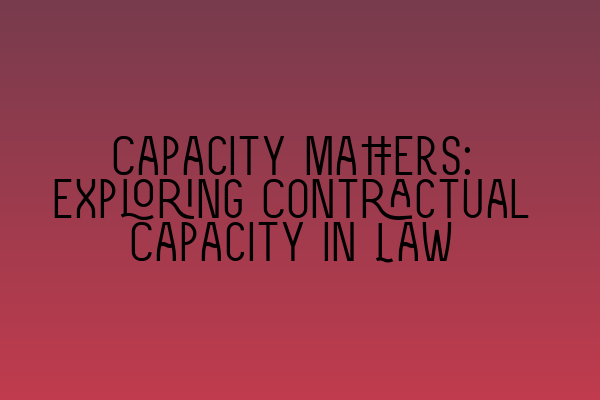Capacity Matters: Exploring Contractual Capacity in Law
Welcome to SQE Contract Law, where we delve into the intricate world of contract law. In this article, we will be exploring the concept of contractual capacity, a fundamental principle that underpins the validity of a contract. Understanding the importance of contractual capacity is crucial for legal practitioners, as it ensures that parties to a contract have the mental and legal ability to enter into a legally binding agreement.
What is Contractual Capacity?
Contractual capacity refers to the legal ability of parties to enter into a contract. It assesses whether individuals possess the mental capacity and legal authority to be bound by the terms of an agreement. In simpler terms, the law recognizes that not everyone has the capacity to enter into a contract, and it seeks to protect those who are vulnerable or lack the necessary understanding to make informed decisions.
In most jurisdictions, the general rule is that anyone who is of sound mind and legal age has the capacity to enter into a contract. However, certain exceptions exist, such as contracts with minors, individuals with mental impairments, and those under the influence of drugs or alcohol.
Capacity and Minors
One of the key exceptions to contractual capacity is in the case of minors. Minors are individuals who have not yet reached the age of majority, which varies between jurisdictions. In many countries, the age of majority is 18, but it can differ depending on the legal system in place.
Contracts with minors are generally considered voidable, meaning that the minor has the option to either enforce the contract or disaffirm it. This provides protection for minors who may lack the necessary judgment or understanding to fully appreciate the implications of a contract. However, there can be exceptions to this rule, such as contracts for necessities or contracts entered into by emancipated minors.
If you want to test your knowledge on contract law, consider trying our SQE 1 Practice Exam Questions or taking our SQE 1 Practice Mocks FLK1 FLK2.
Capacity and Mental Impairments
Another important aspect of contractual capacity relates to individuals with mental impairments. The law recognizes that certain individuals may lack the mental capacity to understand the nature and consequences of a contract. These individuals are deemed to be legally incapacitated.
Legal incapacity can be due to various factors, such as intellectual disabilities, mental illness, or senility. When assessing contractual capacity, the focus is on whether the individual had the ability to understand the nature of the agreement and the obligations involved.
If you are looking to enhance your understanding of contract law and prepare for the SQE exams, check out our comprehensive SQE 2 Preparation Courses and SQE 1 Preparation Courses.
Capacity and Intoxication
Intoxication, whether through drugs or alcohol, can also impact a person’s contractual capacity. When an individual is under the influence, their judgment and decision-making abilities may be impaired, rendering them incapable of understanding the terms and implications of a contract.
In most jurisdictions, contracts entered into while under the influence of drugs or alcohol are considered voidable. However, the level of intoxication required to invalidate a contract may vary, and it is important to consult local laws and regulations for specific guidelines.
Conclusion
Contractual capacity is a fundamental principle of contract law, ensuring that parties to a contract have the mental and legal ability to enter into a binding agreement. It protects individuals who may be vulnerable or lack the necessary understanding to make informed decisions. By understanding the exceptions to contractual capacity, such as contracts with minors, individuals with mental impairments, and those under the influence, legal practitioners can navigate the intricacies of contract law with confidence.
If you are preparing for the SRA SQE exams, make sure to stay updated with the latest SRA SQE Exam Dates to plan your studies effectively.
For more information on contract law and other legal topics, stay tuned for our upcoming articles at SQE Contract Law.
